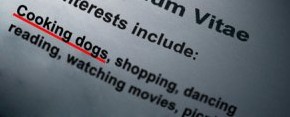Anyone who’s taken a look at the current economic climate knows the job hunt is a far more serious hunt than it was in past decades. This means that many students who are entering the work force for the first time are going up against not just their peers, but against seasoned veterans for many of the same positions. Here are some of the most common mistakes students make when searching for a job, and how to avoid these pitfalls to become the master hunter and land the “big one.”
Networking
The first mistake many post-college job-seekers make is by not understanding the importance of networking. When a company has a position to fill, and a whole pile of resumes to sift through, employers are going to make the selection as easy on themselves as possible, usually starting their selection process with a referral. While networking won’t always guarantee you the job, it will give you what most others would die for, a foot in the door. Good networking isn’t about nepotism, it’s about forging connections, and any chance to build more connections should be taken advantage of.
Myopic Searches
The second mistake many new job-seekers make is having too restricted a view of their job targets. Many recent grads either target only a select handful of companies, or, as is often the case, they select a particular city they want to work in and only apply to jobs within that city. Job seekers should think of their first job post-college as one that provides similar opportunities as college: a chance to go anywhere, if only for a year or two, to build on their experience, education and create some lasting networking connections. Many jobs for new grads involve travel, which might seem daunting at first, but travel allows for more networking to occur across the country; and who knows, networking might just lead to a better job in a better city.
The Resume
Your resume might seem like an arbitrary piece of paper that won’t matter as much once the interview comes around; and while that might be true for some companies, it is precisely that piece of paper that will dictate whether or not you move on to an interview. Organize your resume as concisely as possible and make sure you tailor each one specifically for the company you’re applying to. It’s not necessary to send a two-page resume filled with your high school retail jobs, college intramurals and course listing. Find the shortest ways to accurately represent who you are and what you’ve done. Your resume doesn’t have to have all of the details, save those for the interview- in fact, those lack of details, the intrigue, might be what gets you to the interview.
The Cover Letter
Your resume, once you’ve revised it, should be relatively easy to customize. The cover letter will likely be a little harder but is possibly the most important document you’ll submit. Do Your Research! Search through the company’s website or find some recent articles about the company that you can include in your letter. The cover letter is a sales pitch. You’ve got to sell yourself and your services; more importantly, you’ve got to sell yourself to the company by what you can do for the company. Try to eliminate “me” and “I” from your cover letter whenever possible, focusing instead on “you.” A good cover letter will lay out all the reasons why this company has to hire you.
A Numbers Game
Finally, job seeking is all about the numbers. The more applications and resumes you have out there the better your chances of getting the job. Don’t just shotgun mass emails out there; find an acceptable number of applications to send out per day or per week, and then follow up with those companies after about two weeks. This will keep you constantly moving and not getting hung up on one particular job.
Avoiding these mistakes will put your candidacy well above your peers, illuminating your professionalism, energy and drive: the top aspects every employer is looking for in their ideal hires.
ABOUT AUTHOR:
Samuel Clemens is a former educator who has been writing about study tools and student resources for many years. Visit Gradesaver’s website to see the literature study guides he recommends.


